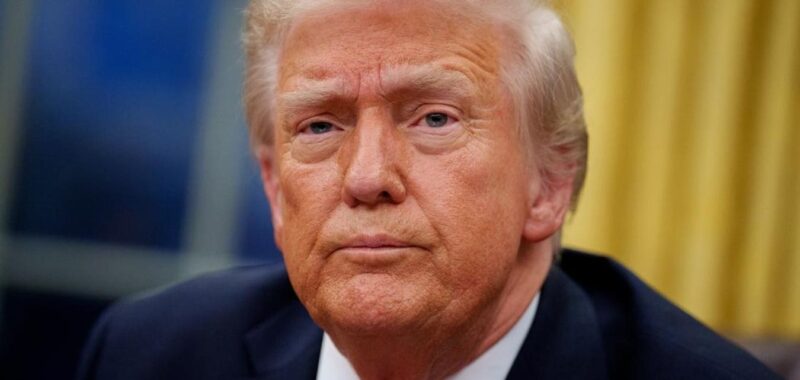Topline
President Donald Trump told Walmart to stop blaming his sweeping tariffs as the reason for price increases, urging the retail conglomerate to absorb the costs of the tariffs as it prepares to raise the prices of several goods this month.
Trump blasted Walmart in a Truth Social post Saturday morning. (Photo by Andrew Harnik/Getty Images)
Key Facts
Trump told Walmart to “EAT THE TARIFFS” in a Truth Social post, telling the retailer to not charge customers anything extra as his tariffs begin to take effect.
John David Rainey, Walmart’s chief financial officer, told CNBC this week the increase in tariffs is “more than any supplier can absorb and so I’m concerned that [the] consumer is going to start seeing higher prices” toward the end of May and even more so in June.
What Walmart Items Could Tariffs Make More Expensive?
Walmart CEO Doug McMillon said during the retailer’s first quarter earnings call that tariffs on trading partners like Columbia, Peru and Costa Rica have applied pressure on the prices of bananas, avocados and coffee. However, McMillon has assured consumers Walmart “won’t let tariff-related cost pressure on some general merchandise items put pressure on food prices.” Child products such as strollers, car seats and toys could also see a jump in cost despite Trump’s recent decision to lower tariff rates on most Chinese goods to 30%. McMillion also noted electronics prices could be pressured, as China represents a large share of imported electronic products.
Crucial Quote
“Walmart should STOP trying to blame Tariffs as the reason for raising prices throughout the chain,” Trump said. “Walmart made BILLIONS OF DOLLARS last year, far more than expected. Between Walmart and China they should, as is said, ‘EAT THE TARIFFS,’ and not charge valued customers ANYTHING. I’ll be watching, and so will your customers!!!”
What Other Companies Have Warned Of Tariff Impacts?
Foxconn, one of the world’s largest contract manufacturers and a major Apple partner, recently downgraded its outlook from “strong growth” to “significant growth,” with the manufacturer’s chairman saying “changes in U.S. tariff policies have considerably impacted the global supply chain…with recent exchange rate fluctuations adding to the uncertainty.” Toyota cited the impact of U.S. tariffs when it estimated $1.25 billion in profits were erased in April and March. Toy company Mattel paused its full-year guidance this month over the tariffs and said it may raise prices of its toys “where necessary.” (Check here for a full list of companies feeling the tariff crunch).
Why Do Businesses Increase Prices Over Tariffs?
Tariffs are taxes on imported goods, raising costs for the companies importing the goods. Companies may pass those higher import costs onto customers by raising retail prices.
Key Background
Much of the uncertainty from large companies over tariffs comes as Trump has repeatedly flip-flopped on tariff rates against various countries. In April, the president issued 10% baseline tariffs on imports from scores of countries throughout the world, with some countries getting hit with rates as high as 50%. China, a manufacturing superpower, was hit with 145% tariff rates before the U.S. and China agreed to a 90-day reduction in rates, dropping the levy on Chinese goods to 30% as negotiations continue. Trump’s tariffs have shaken up markets while also stoking fears of a recession. Experts have said tariffs will provoke higher inflation, but the Trump administration’s ever-changing tariff policy has made it hard to predict the extent of any inflationary impact.
Further Reading
Trump Suggests He’ll Set New Tariff Rates Without Making Deals—Latest Big Tariff Flip-Flop Since ‘Liberation Day’ (Forbes)
Walmart Could Raise Prices Soon Amid ‘Too High’ Tariffs—Joining These Companies Warning Of Tariff Impacts (Forbes)

